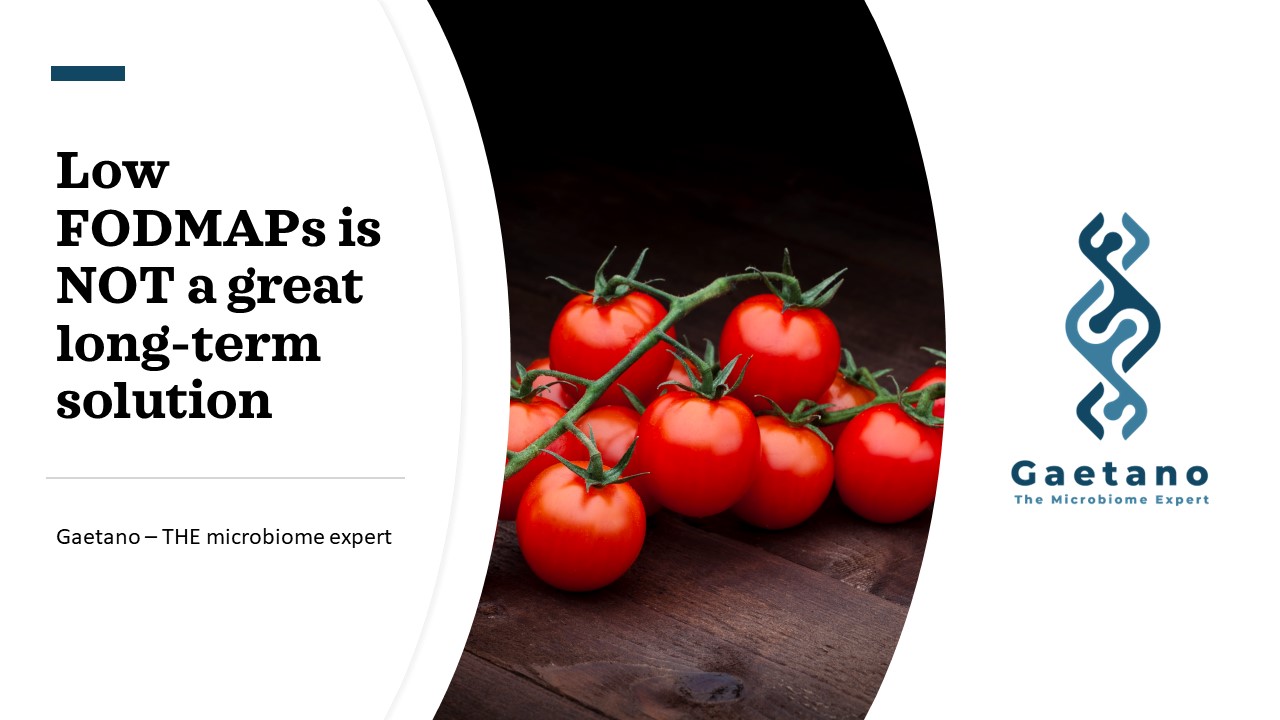Perhaps you’re considering following the low FODMAPs diet. Or maybe you’re on it right now. Even still, you could be a practitioner recommending this diet, usually to people with IBS and/or SIBO. If so, you need to read this blog and watch my free video on this topic, found on my YouTube channel or here on my website in the Microbiome University tab.
This diet now has its own little cottage industry. There are many books, food products and more trying to make a dollar on the back of this craziness. But is this diet deserving of your money and personal commitment?
Let me first start by saying that, in general, it does do a good job of reducing gut symptoms. I’m not going to dispute that point. However, PPIs also do a very good job at reducing gastric symptoms, but they dramatically worsen the microbiome. I have a whole presentation dedicated to this, which you can view in Microbiome University. Like proton pump inhibitors (PPIs), the low FODMAPs diet worsens your microbiome. So, you have to ask yourself, “am I focused on symptoms, or should I be focused the root cause?”
The dysbiotic, immuno-stimulated gut is going to react to foods. And in the short term, it’s important to modify your diet to reduce inflammation while you heal. The most immunostimulatory food group there is, are dairy products. They are immunostimulatory because they possess certain amino-acid sequences which can be highly problematic. So, I am in agreement with this aspect of the diet, although the low FODMAPs incomplete perspective is only that of lactose.
However, the elimination of many of the healthiest foods we know of, like asparagus, broccoli, apples, onions, beets, garlic and more is a terrible idea. These great foods are victims of this diet due to the prebiotics they contain. Because these prebiotics are substrates/fuels which can be fermented by bacteria in the gut, causing symptoms.
Aside from the additional stupidity of eliminating the many nutrients, compounds and phytochemicals that these wonderful foods bring to the table, the elimination of the prebiotics within also has significant implications. You see, these prebiotics generally feed health-promoting bacteria. These bacteria have names you’ve never heard of before, names like Faecalibacterium prausnitizii, Roseburia, Coprococcus, Eubacterium rectale and more. Out of about 1,500 different species in your gut, it is these bacteria which largely determine your health. And their favorite fuels/substrates are prebiotics like inulin, pectin, arabinoxylans and more, which are eliminated in the low FODMAPs diet.
As a consequence, their numbers are reduced. It’s obvious right? If you take away the favorite foods of anything, the numbers will go down. What takes their place in the vacated real estate? Other actors who you’d rather not have in abundance. The long-term consequence is that your microbiome worsens, and you could then become more and more reactive to other foods, painting yourself into a corner with a very limited diet. I’ve seen this many times.
Yes, there is a smarter way to go about this. As the former director of medical education for a microbiome firm, I’ve now launched my own platform to truly educate you on the microbiome. I’ve had amazing success over the years, and my knowledge base is now available to you. So, watch my free presentation on why the low FODMAPs diet is not a good idea. And if you’re still hungry for more information after that, I have something on every conceivable topic on the microbiome, and I show you the data to support everything I say. Is anyone else doing that?
In our world as it is, we all now have to be our own health advocates. With a broken government, food and medical system, you need to take charge of your healthcare. So, educate yourself, as best you can. This is why I’ve launched my educational platform. For you. If you think your health would be well served by addressing your microbiome, you can visit the Protocols tab on my website, and for the mere price of a cup of coffee, you can find a science-based protocol which may dramatically improve your quality of life.

